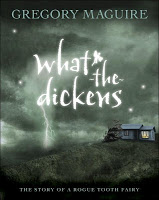This book was a 2007 Science Fiction & Fantasy Cybils Award Nominee.
I hate to admit it, but every time I think of the song “Do You Believe in Magic?” I think of that horrible McDonalds commercial from when I was a kid. But it’s an appropriate title for a review of Gregory Maguire’s latest novel for young readers, What-the-Dickens: The Story of a Rogue Tooth Fairy. 10-year-old Dinah, her older brother Zeke, and her little sister Rebecca Ruth live on an out-of-the-way plot of land in the hills, and are essentially cut off from the rest of civilization when a disaster hits.
Their parents leave to find help, and they’re left behind with their older cousin Gage, an English teacher. To help pass the time, and distract them from the dwindling food supply and their uncertain fate, Gage begins telling them a fanciful tale. Dinah, an imaginative child, is immediately drawn in, though her brother Zeke doesn’t approve–they’ve been homeschooled by parents of fairly strict religious faith, and Zeke doesn’t see how a fairy story could possibly benefit them.
But it’s no ordinary fairy story. Gage begins to relate the adventuresome tale of an orphaned tooth fairy–known as a skibberee–named What-the-Dickens, who is born inside an abandoned tuna fish can and rises from these humble beginnings to discover a whole wide world that’s completely new to him. After a few frightening but hilariously described run-ins with animals and humans, he meets Pepper, a fellow tooth fairy from a local colony. The tooth fairy business is run a bit like a homegrown military operation, and the more What-the-Dickens learns more about his fellow skibbereen and their role in granting wishes and leaving coins under pillows, the more puzzled he is about his own purpose in life.
Maguire has a quirky and vivid writing style, with some beautiful turns of phrase, and this book is both funny and deep. It leaves the reader thinking about the role of fantasy and the imagination in the overall life of the mind; how, as humans, we can’t live without stories, because they lend depth and insight to our “real” lives. Though it’s appropriate for middle-grade readers, this one would appeal to older readers just as much.

*Sigh* Wish I could have gotten this one, too. I like the idea of a person raised conservatively learning the value of story. That’s MY story!
I think you’d enjoy it–somehow it’s really zany but also very touching. I think he’s really refined his writing style, too.